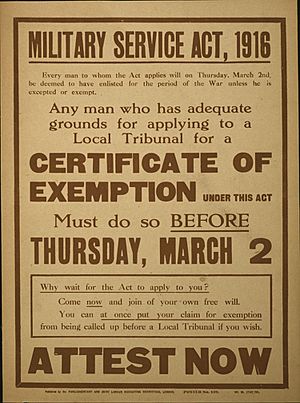Military Service Act 1916 facts for kids
| Act of Parliament | |

|
|
| Long title | An Act to make provision with respect to Military Service in connexion with the present War. |
|---|---|
| Citation | 5 & 6 Geo. 5. c. 104 |
| Dates | |
| Royal assent | 27 January 1916 |
| Other legislation | |
| Repealed by | Statute Law Revision Act 1927 |
|
Status: Repealed
|
|
| Text of statute as originally enacted | |
The Military Service Act 1916 was a law made by the Parliament of the United Kingdom during the First World War. This Act introduced conscription, which meant that certain men had to join the army. Before this law, people joined the army voluntarily. This Act applied only to Great Britain, not to Ireland or other parts of the British Empire.
Why the Act Was Needed
The British government had relied on volunteers to fight in World War I. However, as the war continued, fewer men were signing up. To make sure there were enough soldiers, the Prime Minister, H. H. Asquith, introduced this new law.
The law was first proposed in January 1916. It officially became law on January 27, 1916. It started to be used on March 2, 1916.
Who Had to Serve?
The Military Service Act 1916 said that men aged 18 to 41 had to join the army. However, some men were exempt, meaning they did not have to serve.
These exemptions included:
- Men who were married.
- Widowers who had children.
- Men already serving in the Royal Navy.
- Ministers of religion (like priests or pastors).
- Men working in certain important jobs, called "reserved occupations." These jobs were vital for the country to keep running during the war.
- Men who had a "conscientious objection" to fighting. This meant they had strong moral or religious beliefs against war.
Later, in May 1916, another law was passed. This law made married men also eligible for military service. In 1918, the age limit was raised to 51 years old.
Objecting to Service
If a man or his employer thought he should not have to join the army, they could object. They would apply to a local Military Service Tribunal. These tribunals were special courts set up to hear these cases.
The tribunals could give exemptions from service. These exemptions were often temporary or had conditions. For the first time in history, conscientious objection was a valid reason for exemption. If someone disagreed with the tribunal's decision, they could appeal. They could go to a County Appeal Tribunal, and then to a Central Tribunal in Westminster, London.
The Act and Ireland
The Military Service Act of 1916 only applied to men living in Great Britain. It did not apply to men living in Ireland, even though Ireland was part of the United Kingdom of Great Britain and Ireland at the time.
The British government tried to make conscription apply to Ireland in 1918. This led to the Conscription Crisis of 1918. Many people in Ireland were against it. Sinn Féin, a political party, was seen as a main leader of this opposition. The government arrested many Sinn Féin leaders, claiming they were working with the Germans. However, this only made more people support Sinn Féin.
See also
- Recruitment to the British Army during the First World War
- Reserved occupations
 | Kyle Baker |
 | Joseph Yoakum |
 | Laura Wheeler Waring |
 | Henry Ossawa Tanner |


